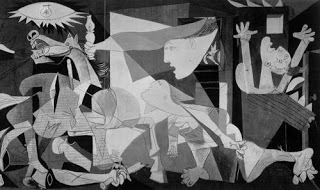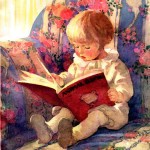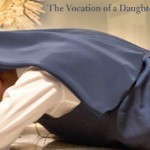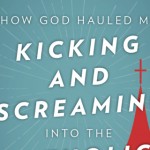The [artistic] intuition .. springs from the depths of the human soul, where the desire to give meaning to one’s own life is joined by the fleeting vision of beauty and of the mysterious unity of things.
 |
| Picasso’s Guernica, 1937 |
Unity is something often found beneath great art because art’s message, while not always easily articulated, calls us to see our common humanity. This is why I think politicized art rarely becomes great art. Often when an artist has an agenda, their work loses power. God always has messages that are deeper and higher than our own.
When Picasso was pressed to explain the painting, he responded:
If you give a meaning to certain things in my paintings it may be very true, but it is not my idea to give this meaning. What ideas and conclusions you have got I obtained too, but instinctively, unconsciously. I make the painting for the painting. I paint the objects for what they are.
This, I think, is a beautiful description of the artistic process and a reason that politics and art can never be true bedfellows. Politics demands articulation. Art calls a person to something beyond articulation.
But this does not mean that art cannot be highly effective in shaping a person’s view of moral issues, which can then impact the political world. This may seem like an obvious point but I think it is lost on many Christians who seek to change minds and hearts. We often resort to logical arguments before we get creative.
And honestly, I think the reason lies in our desire to control. We are fearful of where our country is headed, so we want to control our message. We would rather write poor imitations of Mere Christianity, than the Chronicles of Narnia. Or make movies like October Baby rather than Bella or The Tree of Life.
So instead of taking risks, we often just stick to cold, hard, logic. The problem with good logic is that it depends on well formed premises. People are not always open to questioning the flawed premises that underlie erroneous moral beliefs. When we focus only on logic, we battle head to head but it often looks like no one is really winning because the actual premises of the logic on both sides are rarely discussed.
Art gets to premises. It gets to our gut. It does a limbo dance under our overactive and error prone minds and cuts right to the heart.
I think this is something to think about as the election season wraps up. How did we as Christians express our morality informed by faith in this election? I am not saying that reasoned arguments aren’t necessary, certainly they are. But perhaps more good art, the kind of art that taps into peoples’ hearts on a deeper level and leaves them with more freedom to come to their own conclusions, would be more effective? And perhaps, as an added bonus, because of the unifying nature of art, it would lead to less divisive politics.
Certainly there were big stakes in this election and in our society, but perhaps the fight requires some different tactics.
Perhaps there is another way.
Perhaps we need art.












